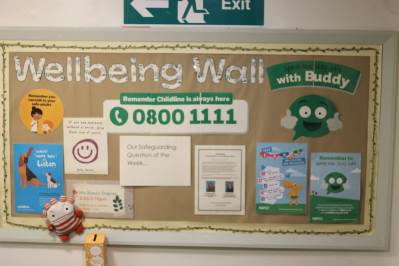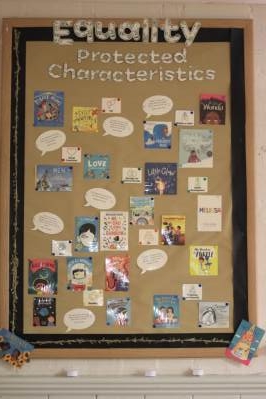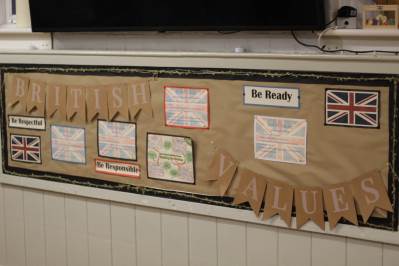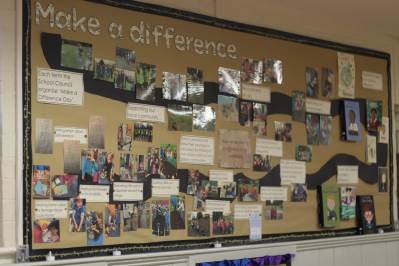Equality, Diversity & Inclusion
Single Equality Scheme 2024-25
Equality vision statement from North Yorkshire County Council:
"Working towards a society in which there is a common vision and sense of belonging by all communities; a society in which the diversity of people's backgrounds and circumstances is appreciated and valued; a society in which similar life opportunities are available for all; a society in which strong and positive relationships exist and continue to be developed in the workplace, in schools and in the wider community."
This means that in our schools and settings we need to:
- know our communities (social identity factors of age, gender, disability, social class, religion, sexuality, ethnicity);
- find out about about the impact of social identity factors on experiences (analysing the data and asking 'how is it for you?');
- address unequal outcomes by doing things differently and by anticipating need;
- help children and young people to learn to understand others and to value diversity challenge prejudice and misconceptions
Equality Statement 2024-2028
Burton Leonard C of E Primary School fosters a welcoming, caring, stimulating and secure environment which encourages development in all aspects of children’s growth individuals. The nurturing of all within the school based on values of love, courage and service enables the broadening of horizons and the development of children’s all round potential. Through our values and ethos, we provide a welcoming and inclusive environment where everyone is cherished and where all flourish.
We are committed to:
Equal access and treatment for everyone
- Being responsive to changing needs
- Educating and informing children, staff and parents about the issues in this policy
- Avoiding prejudice
- Promoting mutual respect, regardless of differences
- Working to an agreed code of conduct which can be modified, monitored and evaluated in accordance with current best practice in the area of equal opportunities
Our school complies with and is committed to the Public Sector Equality Duty (PSED). The public sector equality duty (PSED) is a legal requirement for public authorities and organisations carrying out public functions.
https://www.equalityhumanrights.com/guidance/public-sector-equality-duty-psed
The Equality Act (2010) was introduced to combine the Sex Discrimination Act 1975, Race Relations Act 1976 and Disability Discrimination Act 1995. Previously public bodies were bound by these three sets of duties to promote disability, race and gender equality. In April 2011 these were replaced by a single public sector equality duty (known as the PSED or the equality duty). This new duty extends to all the aspects of a person’s identity that are protected under the Equality Act 2010. These are known as protected characteristics and are:
- age
- disability
- gender reassignment
- marriage and civil partnership
- pregnancy and maternity
- race
- religion or belief
- sex
- sexual orientation.
Equality Displays
General duty
Public bodies including schools and settings have a general duty to have due regard when making decisions and developing policies, to:
– Eliminate discrimination, harassment, victimisation and other conduct that is prohibited by the Equality Act 2010.
– Advance equality of opportunity between people who share a protected characteristic and people who do not share it.
– Foster good relations across all protected characteristics – between people who share a protected characteristic and people who do not share it.
Specific duty
To help schools and maintained EYFS settings in England meet the general equality duty, there are two specific duties that they are required to carry out. These are:
– To publish information to demonstrate how they are complying with the equality duty.
– To prepare and publish one or more specific and measurable equality objectives.
Roles and responsibilities
The Governing Board will:
- Ensure that the equality information and objectives as set out in this statement are published and communicated throughout the school, including to staff, pupils and parents, and that they are reviewed and updated at least once every four years
- Delegate responsibility for monitoring the achievement of the objectives on a regular basis to the Headteacher who will endeavour to ensure the objectives remain relevant and up to date.
The Headteacher will:
- ensure that knowledge and understanding of the equality objectives are promoted amongst staff and pupils at Burton Leonard Primary School
- Monitor success in achieving the objectives and report back to the governors
Staff will ensure that
- Teaching and learning takes this policy into account
- Diversity will be recognised as a positive, rich resource for teaching, learning and the curriculum at Burton Leonard Primary School.
Equality Objectives 2024-2028
- To ensure equality of opportunity permeates the whole curriculum and ethos of the school
- To acknowledge and appreciate the richness and diversity of modern-day, British society in order to help prepare our children for their part in that society and to flourish.
- To continue to develop a positive attitude to equal opportunity by all staff, parents, helpers, governors, children and all who participate in the life of Burton Leonard Primary School.
- To continue to promote equality of opportunity as part of our enrichment curriculum including increasing the range of resources which depict positive images of people with protected characteristics.
Equality
We pride ourselves on being a welcoming and inclusive school. Equality means that everyone is able to participate and feel welcome and safe in the activities of our school. This includes pupils, parents, staff, governors and visitors. Everyone should be able to achieve the best possible outcomes as a result of their participation. We believe that equality should permeate all aspects of school life and is the responsibility of all members of the school and community.
Diversity
Diversity means acknowledging that there are differences between people that should be recognised, respected and celebrated. We promote respect of each other’s differences and identities. We celebrate and raise awareness of diversity in the school and in the wider community and believe that teaching children about diversity prepares them for life in modern Britain.
Inclusion
It is essential to provide a well balanced, challenging curriculum for all pupils. Inclusion looks at the needs of all pupils.
Our aim is to provide all children with the best possible outcomes in preparation for life-long learning. It is important that children acquire skills, knowledge and confidence that can be applied to all future learning experiences, including social, physical and spiritual development. We endeavour to raise aspirations and expectations for all pupils by working in partnership with parents/carers and listening to our pupils. Pupils can access a daily drop-in with our Pastoral Support Officer to ensure that their voices are heard and their thoughts considered.
Protected Characteristics
The use of Picture News allows us to make pertinent links to protected characteristics. We value opportunities to explore these through current affairs and literature.

As a Church of England School, we refer to the document Valuing All Gods Children to guide policy and ensure all children are safe and given the opportunity to flourish
What we do:
- We have active pupil voice groups
- Sports leaders in upper key stage two run activities for outdoors and ensure all children have access
- Friendship benches provide a place for pupils to go if they need a friend - ensuring no-one is left out or feels alone
- Children are involved with local community events - The local Flower Show, Church events, 10K
- Charity events and fundraising – as a church school we support a local, national and global charities
- Visits to and visitors from other cultures and backgrounds to work with the children
- Children take part in supporting members of the local community: Preparing for and taking part in Remembrance celebrations, sharing acts of kindness, taking part in local community events
- Children have opportunity to learn about being effective citizens including through daily worship and workshops provided by other professionals such as the local police and other professionals
- Deliberate purchasing of books for classes and the library that reflect the entire school community and that celebrate diversity through the curriculum
- Diversity, identity and heritage are identified curriculum ribbons




